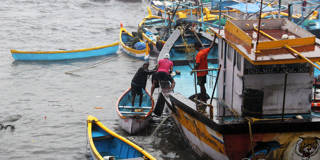Cyclone Ockhi has made painfully clear that all is not well for India’s fishing communities. To prevent the next natural disaster from causing so much damage and inflicting so much pain, India's government must take action to improve disaster prediction and response, as well as to strengthen fishing communities' long-term economic prospects.
NEW DELHI – Last month, a devastating cyclone swept the southern tip of India, causing immense damage to parts of Kerala, Tamil Nadu, and Lakshadweep. Most victims of the oddly named Cyclone Ockhi were fishermen from the districts of Thiruvananthapuram (in Kerala) and Kanyakumari (in Tamil Nadu) who, owing to the lack of a timely cyclone alert, had ventured out to sea, unaware of the danger. Their tragedy highlights the extreme vulnerability of India’s poor coastal communities to the vagaries of nature.

NEW DELHI – Last month, a devastating cyclone swept the southern tip of India, causing immense damage to parts of Kerala, Tamil Nadu, and Lakshadweep. Most victims of the oddly named Cyclone Ockhi were fishermen from the districts of Thiruvananthapuram (in Kerala) and Kanyakumari (in Tamil Nadu) who, owing to the lack of a timely cyclone alert, had ventured out to sea, unaware of the danger. Their tragedy highlights the extreme vulnerability of India’s poor coastal communities to the vagaries of nature.